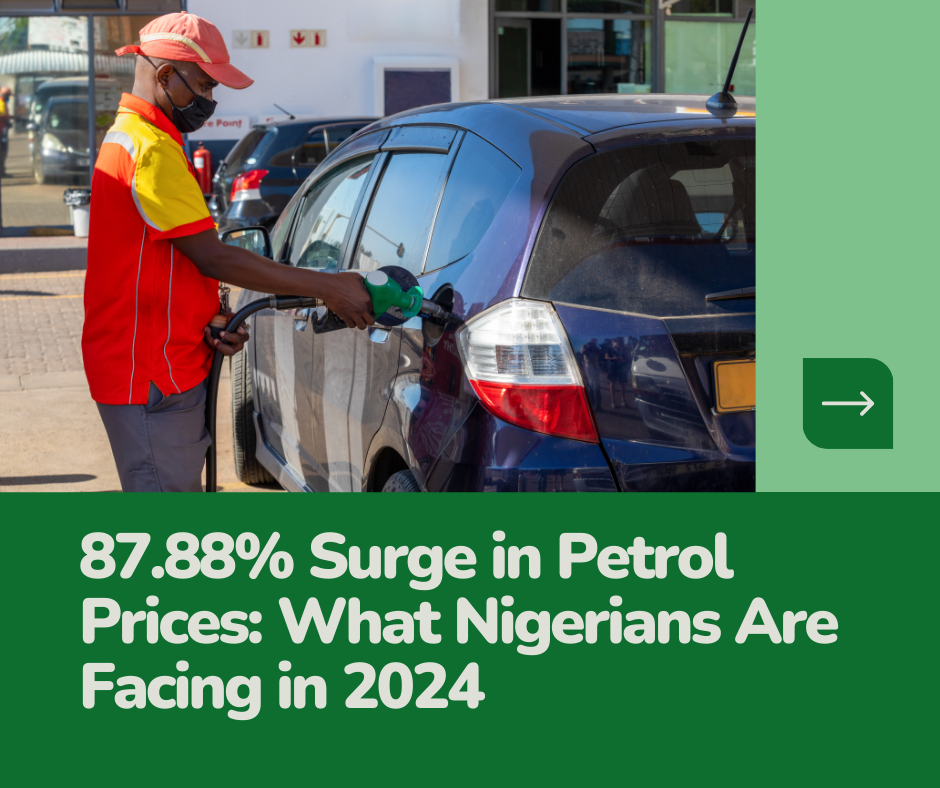
87.88% Surge in Petrol Prices: What Nigerians Are Facing in 2024
In a country where fuel prices directly impact the everyday life of the average citizen, October 2024 has brought a significant shock to Nigerians. The Premium Motor Spirit (PMS) price surged by an astonishing 87.88% compared to October 2023. This unexpected increase in fuel costs not only affects transportation expenses but also ripples through every facet of the economy, from food prices to small business operations. Let’s dive into the details of how this is affecting Nigerians and what lies ahead.
Overview of the Price Hike
The latest data from the National Bureau of Statistics (NBS) indicates that the average retail price for Premium Motor Spirit (petrol) across Nigeria in October 2024 stood at N1,184.83. This marks a substantial jump from N630.63 recorded during the same period in 2023, signaling an 87.88% year-on-year increase. Even compared to the previous month, September 2024, the petrol price increased by 14.98% from N1,030.46.
The Price Variation Across States
Fuel prices have always been a contentious issue in Nigeria, with the costs varying significantly from state to state. In October 2024, Ebonyi State recorded the highest average price for petrol at N1,292.86 per liter, closely followed by Jigawa at N1,288.18 and Borno at N1,283.79. On the other hand, states such as Delta, Nasarawa, and Lagos had the lowest average retail prices, with figures like N1,050.00, N1,063.68, and N1,080.95 respectively.
This disparity is often influenced by factors such as transportation costs, local distribution challenges, and government policies in different states. For example, fuel tends to be cheaper in coastal areas with easier access to imports, while inland regions often face higher prices due to transportation costs.
Zonal Price Analysis
A zonal breakdown of the price reveals even more about the regional disparities in fuel costs:
- The South East Zone had the highest average retail price, at N1,256.76 per liter.
- In contrast, the North Central Zone reported the lowest average price, at N1,132.94.
The variation across zones highlights the infrastructural and logistical issues affecting the distribution of petrol in Nigeria. The South East, with its relatively challenging topography and fewer importation points, inevitably faces higher costs.
What’s Driving the Increase?
There are several reasons behind the dramatic increase in PMS prices. One major factor is the ongoing subsidy removal policy implemented by the government. The aim is to reduce the strain on national resources, but this has led to a sharp rise in the retail price of fuel, as the government no longer absorbs part of the cost. The subsidy removal means that prices are now more directly tied to global crude oil prices and the costs associated with refining and distribution.
Another reason for the hike is exchange rate volatility. As the Naira weakens against the US Dollar, the cost of importing petrol rises, which directly translates to higher pump prices. The increasing demand for fuel amid inadequate refining capacity within Nigeria also forces the country to import a majority of its petrol, thereby subjecting local prices to the fluctuations of the international market.
Economic Impact on Nigerians
The impact of this price increase is being felt across all sectors of the economy:
- Transportation Costs: With an almost 88% increase in fuel costs, the price of public and private transportation has surged significantly. Commuters are spending a larger portion of their income on getting to work, school, and other daily activities. This especially impacts low-income earners, who already struggle with tight budgets.
- Food Prices: The cost of food is also on the rise, as the increased transportation cost affects the delivery of goods from farms to markets. In a country where food security is already a critical issue, this spike adds further strain.
- Small Businesses: Many small and medium-sized enterprises (SMEs) that rely on petrol generators for power are also struggling. With the unreliable power supply, these businesses are left with no choice but to bear the brunt of rising fuel costs, which in turn leads to increased prices for goods and services.
- Household Budgets: For households, this price surge means a tighter squeeze on daily expenses. Families are forced to allocate more of their income to fuel, leaving less for essentials like food, healthcare, and education.
State-by-State Analysis
A closer look at specific states reveals notable patterns in petrol pricing:
- In the North East, Borno State witnessed one of the highest price jumps, from N1,004.09 in September to N1,283.79 in October. This 27.86% month-on-month increase indicates how regions with security and logistical challenges face even more acute price pressures.
- In the South South, states like Bayelsa and Cross River experienced significant hikes as well, with prices at N1,250.00 and N1,255.56 respectively, which are driven by both local demand and infrastructural issues.
What Lies Ahead?
As Nigeria continues to grapple with inflation and the removal of fuel subsidies, the forecast for PMS prices remains uncertain. Analysts predict that unless the government introduces mitigating measures, such as improved local refining capacity or targeted subsidies for the most vulnerable citizens, the cost of petrol may continue to rise, putting further strain on an already stretched populace.
One potential bright spot is the recent push towards alternative energy sources. Solar power, electric vehicles, and other renewable energy initiatives are slowly gaining traction, though they are still largely out of reach for most Nigerians due to high initial costs. Nevertheless, a gradual transition could reduce dependence on petrol in the long term, stabilizing energy costs and providing more sustainable solutions.
Conclusion
The 87.88% increase in petrol prices in Nigeria over the past year is more than just a number—it represents the challenges faced by millions of citizens striving to make ends meet in a challenging economic environment. From rising transportation costs to increased food prices, the ripple effects are being felt far and wide. The government’s actions in the coming months, whether through support for alternative energy, increased refining capacity, or relief for vulnerable populations, will be crucial in determining how Nigeria weathers this storm.




